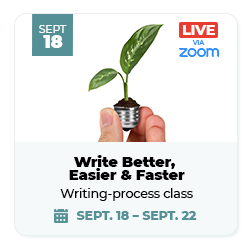Find mentors among your favorite writers
When I was in graduate school, one of my favorite journalism professors, Rick Musser, confessed that he’d always loved the introduction to The Dane Curse, a detective novel by Dashiel Hammett:

It was a diamond all right, shining in the grass, about two dozen feet from the blue brick.
Someday, he promised, he’d find a way to adapt that image into one of his own pieces. Years later, when I was editing a piece he wrote for a magazine I worked at, I saw that he’d made good on his promise. Here’s his opening paragraph for a piece on a millionaire scrap man of Kansas City:
Sure enough, those are pennies down there in the muck, their mangled edges glinting in the Blue Valley sun.
That’s modeling the masters: getting inspiration from the very best writers, then adapting it — not adopting it, but adapting it — to your own work.
Find the template.
Did you ever take your Mom’s toaster apart to figure out how it worked? You can do the same thing with writing.
In my clip file, I have a short piece about Las Vegas from Time magazine. I collected it for a single sentence:
Lounge music may be to the symphony what Velveeta is to cheese — but hey! — it’s all part of what make Las Vegas great.
Take it apart. Here’s what I love about that passage:
- The two comparisons (Lounge music = symphony; Velveeta = cheese)
- The fact that those comparisons are also compared to each other
- The word “Velveeta” (cheesy brand names are always fun)
- The full sentence with an exclamation point between dashes
Put it back together. So now you know what to do: Write a sentence with two comparisons compared to each other, a cheesy brand name and a full sentence with an explanation point between dashes in the middle. The template looks like this:
Blank may be to blank what (funny brand name) is to blank — hypershort sentence! — something.
When I asked participants in a workshop to model that passage, one came up with:
Youth hostels may be to the Hyatt what love beads are to diamonds — but hey! — it’s all part of what makes your Adventures Ltd. vacation great.
The key to modeling is to steal the technique, not the words. Adapt — don’t adopt — other’s approaches.
Try it yourself. Feel free to borrow and improve on other people’s techniques. It’s a widely practiced form of flattery. Take whatever you can, and keep T.S. Eliot’s advice close to heart.
“Amateurs plagiarize,” he said. “Real writers steal.”
Work with — not against — your brain
While we talk a lot about what to write — More stories! Fewer words! Shorter sentences! — we don’t focus so much on how.

Writing is hard because we weren’t taught how to write. Instead, we were taught how to edit: how to spell, punctuate and use the right grammar.
But there is a how to writing. Learn a few simple steps that will make your writing time more effective and efficient at How to write Better, Easier & Faster — our writing-process workshop starting Sept. 18.
You’ll learn to invest your time where it’ll do you the most good … stop committing creative incest … even save time by editing before writing.
Save up to $100 with our group discounts.
